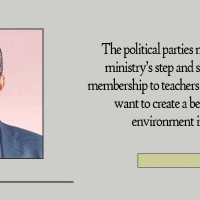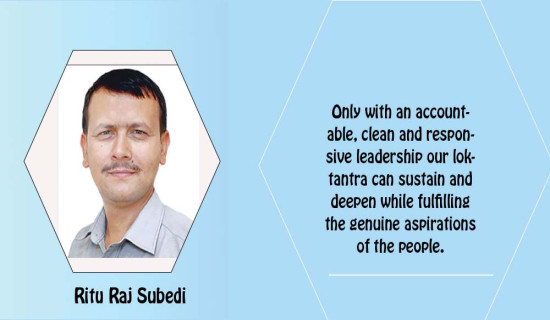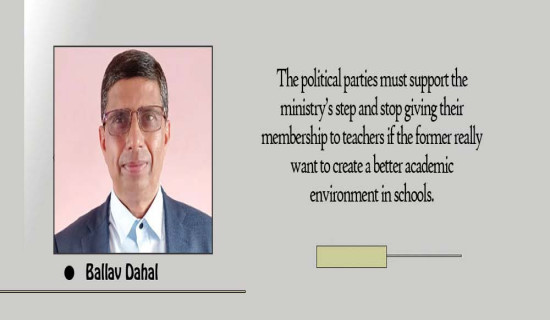- Tuesday, 30 April 2024
Media Trust Under Strain
Two months into a last-ditch effort at hanging on to a marathon legal battle in Britain for avoiding extradition to the United States, WikiLeaks founder Julian Assange is in a dicey situation. His reports were factual to the global public but damagingly embarrassing to the American establishment. The 52-year-old Australian, holed up in London for more than a decade, has exhausted almost all his options as he engages in perhaps the last lap of legal tussle that hangs on a thread. His team of lawyers argue that his disclosures exposed “criminal actions” by the US authorities and thereby served public interest.
Were British law to go against the man responsible for the biggest news scoop so gluttonously snapped up by several prominent media in the US and Europe in 2010, he would be packed off to the US where he faces a series of spying charges, including breaching of law pertaining to classified documents. Millions of people across the world, however, hold Assange in high esteem for the high calibre he displayed in building information sources and bringing to public light the misdeeds US military committed in Afghanistan. Overnight, Julian became a super informer who broke a super secrecy that the world’s No. 1 superpower wanted suppressed from public knowledge.
Free speech fight
The real test for free speech in a society is when an individual or institutional crisis takes a gripping command. The danger aggravates if bigwigs equate their personal problems and crises emanating from wrong doing. Whatever Assange’s personal fate over his mission to reveal and defy the politically mighty ones committed to conceal, the already faltering trustworthiness of news media in even countries listed among the most “advanced democracies” is bound to suffer further. Once the strain from erosion in credibility sinks in and the resultant severe sprain caused by close public scrutiny inevitably generates disenchantment with the failed watchdog of society, a deeply disturbing gap is palpably felt.
Fake news has spread its access to large sections of audiences. A 2023 study report made public in September showed that only a handful among forty European countries reposed more than 50 per cent trust in the news contents they received. Only 19 per cent of Greeks trust the mainstream media. Young Europeans are found increasingly either distrusting or are disenchanted by the quality of contents. Europeans generally consider broadcast channels as carrying more reliable news than what are disseminated by social media. Its steady fall from grace renders the press to being viewed with scepticism. With the decline in news credibility, public distrust of the media deepens, which in turn contributes to misinformation, disinformation and confusion.
It is sad and shocking that the status of a public platform has degraded. This is a ride contrast to how it used to be hailed as ideally the Fourth Estate of the state that remained a consistently critical watchdog chronicling and commenting on current affairs and other relevant issues. Advertising volume not matching the rush in setting up news outlets, entertainment channels and other information platforms brought about by dramatic advance in communication technology caused the trauma faced by the media today. Consequently, in Nepal, for instance, salaries of employees have not increased since several years in most of major media houses. Journalists and other employees have not been paid for three months — and in some cases six months.
Keeping the kitchen fire on, maintaining personal dignity and not losing self-confidence in such circumstance becomes a highly demanding task, especially when employment opportunities in journalism or elsewhere are tightly limited. The message on the board for all formats of journalism and channels is unambiguously blunt: shape up or ship out. Conditions will deteriorate unless media owners and experienced newsroom hands come up with viable plans to address the deepening challenges. How media people adapt to the stupendous task will determine the overall fate and future of their news service, whose professional vibrancy as a common public platform of trust risks dire straits. Traditional media approach to catering to public tastes cannot withstand the prevailing tests in these trying times. Investment of new ideas for the right prescription is required.
Advertising revenue has plummeted both in volume and value even as mass communication avenues multiply and expand. Easy access to numerous information and entertainment channels to suit the tastes of people has changed the scenario dramatically. In a December leader, The Economist weekly magazine (“The media is the message”, 16-12-2023) commented: “[T]he discovery and dissemination of information matters a lot to politics. Today, however, the smartphone has caused fragmentation and American media are back in a narrowcast age… Although most Americans do not regularly read a newspaper or watch cable news, elites matter in democracies. When different political camps exist in separate information universes, they tend to demonise each other.”
Rescue order
In theory, the Press taps a well of information, reporting on events and processes with emphasis on current affairs but never shy or lacking in recalling past experiences from a variety of credible sources, including decision makers, stakeholders and experts. Its critical role perceived so far would be replaced by other media contents as a matter regular visits and consultations by people brought up in environs that previous generations and ages had not imagined. Migrations from news outlets to other channels create a vacuum, which would be not just disappointing but dangerous. For news services contribute to mass connectivity, enabling individuals and institutions to be informed on current affairs and key issues that bind them in common interests.
In the face of shrinking advertising revenues and fragmentation of audience sizes as people keep migrating to non-news media in greater numbers and for longer durations, a strategy of targeting specific audience in specific age group and with specific tastes could keep news outlets on steadier footing. The new game in the news world is all about attracting attention and retaining interests among potential audiences of reading, listening and viewing variety. In a decade, the scenario will change sharply. How quickly and efficiently media organisations assess and address the exacting task will determine whether they sink or swim. Address principles in practice and vice versa.
(Professor Kharel specialises in political communication.)















